Search Results
Showing results 141 to 160 of 231
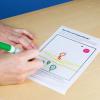
Exploring the Universe: Imagining Life
Source Institutions
“Exploring the Universe: Imagining Life” is a hands-on activity in which visitors imagine and draw an extreme environment beyond Earth, then invent a living thing that could thrive in it.
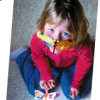
Symmetry of Butterfly Wings
Source Institutions
In this activity, learners investigate balance and symmetry by designing a symmetrical butterfly, using a paper cutout.
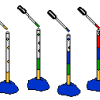
Liquid Layers
Source Institutions
Experiment with liquids of different densities and create liquid layers. For example, oil and water have different densities: oil floats on water because it is less dense than water.
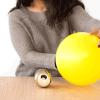
Remote Control Roller: Experiment with Static Electricity
Source Institutions
This activity is an investigation of static electricity. What happens when you get "static cling?" Basically, you pile up electrons on one thing, which attracts the protons in something else.

Brain Box (Bag) of Science
Source Institutions
In this neuroscience activity (5th activity on the page), learners explore their sense of touch without using their senses of vision and hearing.
Rainforest Plant or Animal?
Source Institutions
In this craft activity, learners will compare and contrast the major functions of plants and animals.

Oscillating Woodpecker
Source Institutions
In this activity, learners will experiment with the physics of forces - kinetic energy and friction while making a moving toy woodpecker.
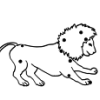
Modeling the Night Sky
Source Institutions
In this two-part activity, learners explore the Earth and Sun's positions in relation to the constellations of the ecliptic with a small model.
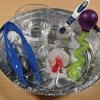
Using Tools and Melting Ice
Source Institutions
In this activity, learners will experiment with different materials that can melt and change ice.
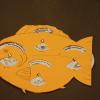
Fish Wheels
Source Institutions
In this activity, learners cut out and assemble wheels to explore how variations in fish body structures (mouth shape/position/teeth, body shape, tail shape, and coloration patterns) allow fish to sur
Magnus Glider
Source Institutions
A design challenge that takes paper airplanes into an entirely different direction: a magnus glider uses cups and and rubber bands to create a glider that uses the same forces that a curveball (from b
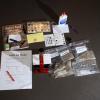
Sand Activity
Source Institutions
In this activity, learners observe mixtures of sand samples glued to note cards, and consider how sand can differ in size, shape, and color, and where it comes from.
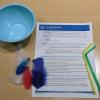
Feather Rockets
Source Institutions
In this activity, learners will make and launch feather rockets. Lerners will use science process skils such as making predictions and measuring while launching the rockets.

Exploring the Solar System: Pocket Solar System
Source Institutions
“Exploring the Solar System: Pocket Solar System” is a hands-on activity in which visitors make a scale model of the distances between objects in our solar system.
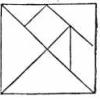
Tricky Tangrams
Source Institutions
In this activity (on pages 49-54 of PDF), learners play with tangrams, a set of triangles, squares and a parallelogram that can combine into a larger square as well as all sorts of other shapes.
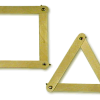
Strong Shapes
Source Institutions
Is a square stronger than a triangle? Use tongue depressors to build simple shapes. Then apply a little weight to them and see what happens!
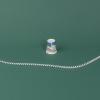
Anti-Sound Spring
Source Institutions
What happens when two wave pulses meet in the middle? Send waves down a spring to watch them travel and interact.

Take Out the Trash
Source Institutions
Learners explore how recyclers take advantage of the different properties of materials, such as magnetism and density, to separate them from a mixture.
Fair Shares: Predict Equal Shares
Source Institutions
Use this activity to build division and number sense into any snack time or whenever there is a limited set of things to share among a group: If we deal these out, could everyone get two pieces?
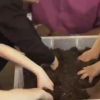
Clean It Up
Source Institutions
In this "Sid the Science Kid" activity, learners get their hands dirty by playing in a container of soil. Then they compare the effectiveness of cleaning their hands with just a paper towel vs.
